
President-elect Donald Trump, in his first television interview since
his surprise election victory, repeated his vows to build a wall across
America's southern border, deport criminal illegal aliens, and repeal
and replace ObamaCare.
Donald Trump
said he planned to immediately deport or jail as many as three million
undocumented immigrants, as he set out his priorities in the first
television interview since his election.
The interview with CBS's "60 Minutes" is to be broadcast on Sunday
with millions expected to tune in for clues on how the billionaire
businessman-turned-politician will govern the country.
Since Tuesday's election triumph, Trump had appeared to tone down his
rhetoric, notably suggesting he might be willing to reconsider a pledge
to scrap President Barack Obama's signature health reform, the
so-called Obamacare.
He made clear, though, in excerpts of Sunday's interview that he
still intended to crack down on undocumented immigrants in the country,
focusing on people with criminal records.
"What we are going to do is get the people that are [criminals] and
have criminal records, gang members, drug dealers," Trump said. "We have
a lot of these people. Probably two million, it could be even three
million. We are getting them out of our country or we are going to
incarcerate.
After the border is secured and after everything gets
normalized," Trump added, "we're going to make a determination on
[other undocumented immigrants] ... But before we make that
determination ... we want to secure our border.
Early in the GOP primaries, Trump had vowed to
immediately deport all 11 million people living in the country
illegally. But his comments Sunday echoed House Speaker Paul Ryan,
R-Wis., who told CNN that the Republican administration was "not looking
for mass deportations."
"We are not going to do that," Ryan emphasized in the interview that aired earlier Sunday.
The real estate mogul also echoed remarks he made to
the Wall Street Journal earlier this week, in which he said he favors
keeping the prohibition against insurers denying coverage because of
patients’ existing conditions, and a provision that allows parents to
provide years of additional coverage for children on their insurance
policies.
"It'll be just fine. We're not going to have, like, a
two day period and we're not going to have-- a two-year period where
there's nothing," Trump said.
Trump also appeared to back away from his promise to
appoint a special prosecutor to investigate his Democratic opponent,
Hillary Clinton, over her use of a private email server. Trump made such
a promise during the second presidential debate against Clinton during a
rhetorical duel that ended with Trump saying if he was president,
"you'd be in jail."
"She did some bad things, I mean she did some bad
things," Trump said, to which Stahl responded, "I know, but a special
prosecutor?"
"I don't want to hurt them, I don't want to hurt them," Trump said. "They’re, they’re good people. I don't want to hurt them."
Regarding another of his campaign promises, Trump
vowed to nominate a Supreme Court justice that would be pro-life and
pro-Second Amendment. However, the president-elect showed no interest in
re-litigating last year's Supreme Court decision legalizing gay
marraige, an issue of departure between him and Vice President-elect
Mike Pence.
"It's irrelevant because it was already settled. It's law. It was
settled in the Supreme Court. I mean it’s done," Trump said, later
adding, "I'm fine with that."
Trump touched on the protests that have broken out
across the nation since his election, complaning that the coverage
represented a "double standard."
"If Hillary had won and if my people went out and protested, everybody
would say, 'Oh, that's a terrible thing,'" he said. "And it would have
been a much different attitude. There is a different attitude."
However the president-elect said that he was
"saddened" by reports that some of his supporters had harassed
minorities since Tuesday's vote.
"And I say, 'Stop it.' ... I will say this, and I will say right to the cameras: Stop it."
Trump also told "60 Minutes" he would eschew the $400,000 annual salary for the president, taking only $1 a year.
Trump's campaign was marked by derogatory comments about race, religion, gender and disability.
However, in his victory speech, he vowed to be a President for "all Americans".







